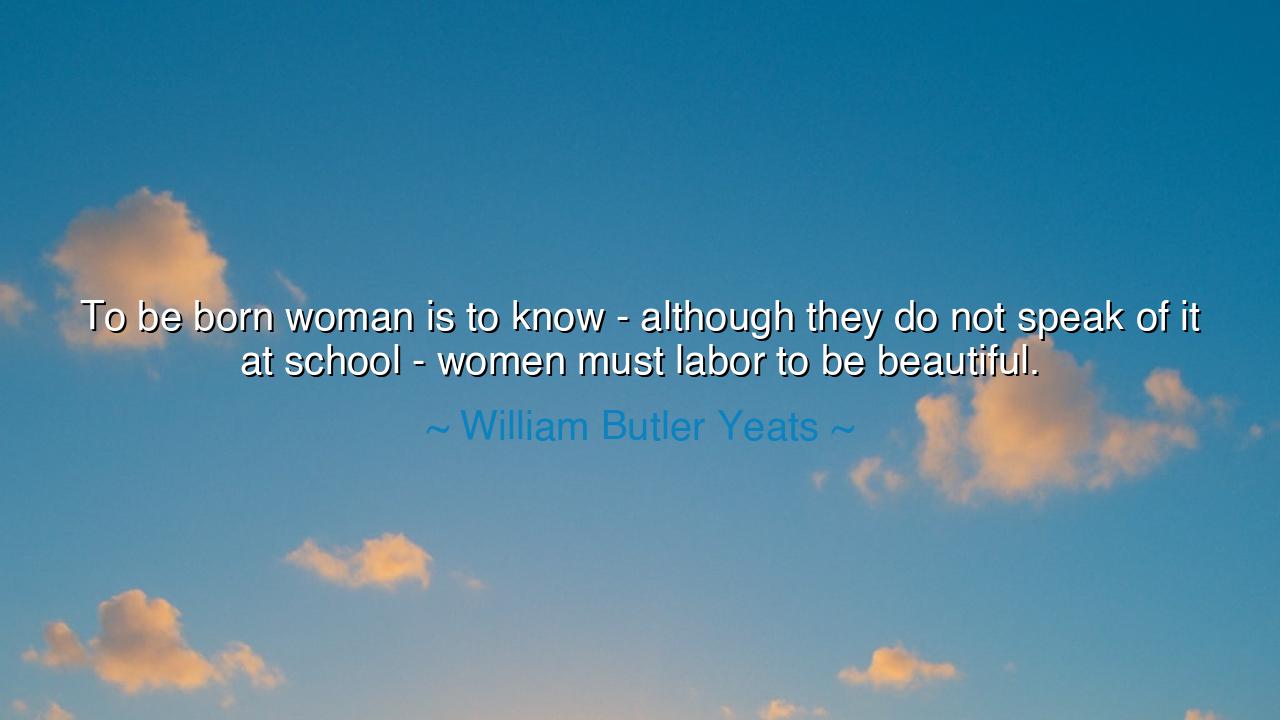
To be born woman is to know - although they do not speak of it
To be born woman is to know - although they do not speak of it at school - women must labor to be beautiful.






William Butler Yeats, poet of mystery and prophet of Ireland’s soul, once declared with aching clarity: “To be born woman is to know—although they do not speak of it at school—women must labor to be beautiful.” In these words he unveils the hidden burden laid upon womanhood: that her worth in the eyes of the world is too often tethered not to wisdom, not to strength, not to spirit, but to beauty. This labor, unspoken yet relentless, is not chosen by her, but demanded by the gaze of society.
The origin of this lament lies in Yeats’s own life, for he was a man enthralled by muses—women like Maud Gonne, whose beauty and fire haunted his poetry and his heart. He saw how the world exalted women for their loveliness, yet overlooked their intellect and courage. Thus, his words are not merely romantic, but sorrowful: he recognized that to be born woman was to inherit a lifelong duty of maintaining an outward grace, a duty taught not in schools but etched into custom and expectation.
History bears grim testimony to this truth. In the courts of Versailles, women labored for hours each day beneath the weight of powdered wigs, corsets, and elaborate gowns. Their beauty was not their own possession, but a form of currency in a world where their influence rose or fell with appearances. The scholar or the warrior might earn esteem by deed, but the woman was told her worth was measured by face and figure. Yeats’s words echo across those gilded chambers, a reminder of the silent toil demanded of women.
Yet his saying also carries a note of reverence. The labor of beauty, though imposed, can be seen as an act of resilience. Women have turned the burden into art, the expectation into power, using beauty not only as adornment but as weapon and shield. Consider Cleopatra, who wielded her allure not as vanity but as strategy, bending empires to her will. Though forced to labor for beauty, she transformed that labor into sovereignty, proving that even in chains of expectation, women could carve out dominion.
Therefore, O seekers of wisdom, let Yeats’s words awaken both compassion and resolve. See clearly the unspoken weight carried by women, and question the world that demands it. For true beauty is not only in the face polished by labor, but in the spirit that endures and transcends. To honor women is not to praise their adornment, but to free them from the burden of having to earn their worth through it. For beauty is fleeting, but dignity is eternal.






NBNgan Bui
Yeats’ words raise a significant question about gender norms and expectations. Why is it that women, from a very young age, are taught that their appearance must be a priority? Shouldn’t the focus shift from maintaining beauty to promoting confidence and self-acceptance? How can we redefine what it means to be beautiful and encourage women to feel empowered in their own skin without feeling that beauty requires constant effort?
TLTuong Le
This quote brings to light how beauty standards are ingrained into women’s lives from a young age. Yeats touches on something many women experience but don't always speak about—the constant pressure to conform to certain ideals of beauty. But does this effort to be beautiful take away from more important qualities like intelligence, creativity, or kindness? How do we help society embrace a broader definition of beauty that isn’t solely dependent on physical appearance?
HNHoang Nhung
Yeats’ reflection on women’s labor to be beautiful seems to highlight an uncomfortable truth: that societal pressures often dictate women’s value based on appearance rather than other qualities. But does this concept of 'laboring for beauty' perpetuate a narrow view of womanhood? Shouldn’t women be free to define their own worth without being held to beauty standards? How do we shift the conversation about beauty to include diverse perspectives and experiences?
NAPham Ngoc Anh
Yeats' quote speaks to the societal expectation that women must work to meet beauty standards, often at the cost of their self-worth or sense of identity. While beauty is often emphasized, is it fair to suggest that women must labor for it? Shouldn't beauty be seen as something inherent and natural, rather than a constant effort? How do we challenge these societal pressures so that women are valued for more than just their appearance?